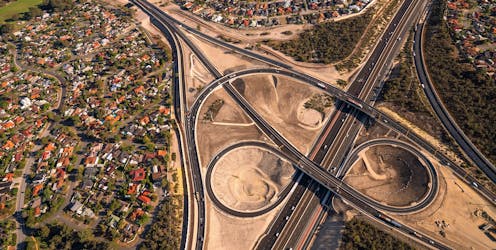How to make roads with recycled waste, and pave the way to a circular economy
- Written by Salman Shooshtarian, Research Fellow, RMIT University

It cost A$49 million[1] to add 12.5 kilometres of extra lanes to Western Australia’s Kwinana Highway, south of Perth’s CBD. That’s not unusual. On average, building a single lane of road costs about about A$5 million per kilometre[2].
What is unusual about this stretch of extra freeway is not the money but the materials beneath the bitumen: two stabilising layers comprised of 25,000 tonnes of crushed recycled concrete[3], about 90% of which came from the demolition of Subiaco Oval (once Perth’s premier football ground).
Recycling building and construction materials remains the exception to the rule in Australia. The National Waste Policy[4] agreed to by federal, state and territory governments has a target of 80% resource recovery by 2030. It’s currently about 40%[5].
Of the 74 million tonnes of waste generated in Australia in 2020[6], masonry materials comprised about 22.9 million tonnes. Plastics, by comparison, comprised about 2.5 million tonnes. Of the 61.5 million tonnes of “core waste” managed by the waste and resource recovery sector, 44% (27 million tonnes) came from the construction and demolition sector, compared with 20% (12.6 million tonnes) from households and local government activities.
Most of this waste – concrete, brick, steel, timber, asphalt and plasterboard or cement sheeting – could be reused or recycled. It ends up in landfill due to simple economics. It’s cheaper to buy new materials and throw them away rather than reuse and recycle.
Changing this equation and moving to a circular economy, in which materials are reused and recycled rather than discarded in landfill, is a key goal to reduce the impact of building and construction on the environment, including its contribution to climate change.
Read more: A third of our waste comes from buildings. This one's designed for reuse and cuts emissions by 88%[7]
The economics of ‘externalities’
The fact it is more “economic” to throw materials away than reuse them is what economists call a market failure, driven by the problem of “externalities”. That is, the social and environmental costs of producing, consuming and throwing away materials is not reflected in the prices charged. Those costs are instead externalised – borne by others.
In such cases there is a legitimate – and necessary – role for governments to intervene and correct the market failure. For an externality such as carbon emissions (imposing costs on future generations) the market-based solution favoured by most economists is a carbon price.
Read more: COP26: cities create over 70% of energy-related emissions. Here's what must change[8]
For construction material waste, governments have a few more policy levers to help create a viable market for more recycling.
Using procurement policies
One way to make recycling more attractive to businesses would be to increase the cost of sending waste materials to landfill. But this would likely have unintended consequences, such as illegal dumping.
The more obvious and effective approach is to help create more demand for recycled materials through government procurement, adopting policies that require suppliers to, for example, use a minimum amount of recycled materials.
With enough demand, recyclers will invest in further waste recovery, reducing the costs. Lower costs in turn create the possibility of greater demand, creating a virtuous circle that leads to a circular economy.
















